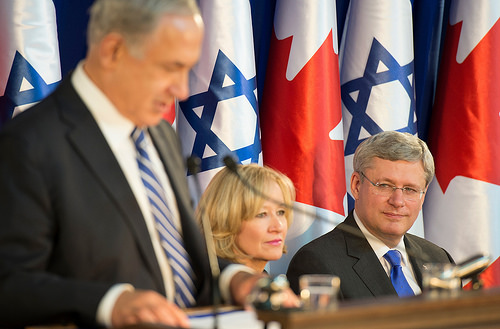If you ask people who run political campaigns at the highest levels, they will tell you that one of their essential tools is a plan. The leader must be able to declare to voters: “Elect me and this is what I will do. Guaranteed.”
The plan doesn’t have to be elaborate or detailed — simpler is better — but campaign strategists say electors are more inclined to support a party with a plan, even if they don’t agree with much of it, over a party that grapples with subtleties and complexities and lacks a clear vision. In other words, black and white works; grey doesn’t.
I’m winding my way to Stephen Harper and Israel. But first, some other examples. Brian Mulroney and the Conservatives won the 1988 federal election by promising free trade with the United States. That policy was not popular, according to polls, and most voters probably had, at best, only a vague idea of what free trade might entail, but they voted for Mulroney and free trade in preference to whatever it was John Turner and the Liberals were offering (who remembers?).
In 1993, Jean Chrétien stumped the country waving his “Red Book” of Liberal commitments. The contents of the book — a mystery to even many Liberals — didn’t matter. The fact of the book and the image of the plan it represented carried Chrétien to a majority government.
To work, a plan needs to seem to be simple and clear. Then-Liberal leader Stéphane Dion confused everyone, including his own followers, in the 2008 election with his environmental “green shift.” Earlier, in 1974, Progressive Conservative leader Robert Stanfield promised to combat inflation with a temporary wage and price freeze, but the Tories could never really explain how their controls would work. Pierre Trudeau and the Liberals laughed them off the hustings. “Zap! You’re frozen!” Trudeau cried.
Trudeau himself had come to power six years earlier by stumping the country, promising to make Canada a “Just Society.” Whatever that slogan meant, it seemed clear enough to voters — and powerful — and Trudeau won in a walk. A triumph for black and white politics.
This brings us, circuitously, to Prime Minister Harper and the Middle East. When Harper played his Israel card last week, there was no grey area, no qualifications, no discreet reservations as he and Israeli Prime Minister Benjamin Netanyahu conferred best-friend status on each other.
Now, Middle East politics is incredibly complex and in the years (pre-Harper) when Canada had a measure of influence there, Canadian diplomats did their best to pick their way through the minefield of conflicting Arab-Israeli interests.
No longer. In the Harper era, Israel is good. Israel is a democracy surrounded by nasty enemies. Canada stands four-square with Israel. Let others worry about those Israeli settlements. Let someone else come up with a peace plan. Canada has Israel’s back.
Harper’s professions of loyalty seem to be sincere. He probably believes most or all what he said in Israel. But his real audience was here at home, not over there.
The Conservatives are in trouble in the polls. They are running 10 to 12 points below their election 2011 level, keeping their heads above the NDP but trailing the Liberals by about six points. Harper’s personal approval has been sliding throughout the Senate expense scandal.
The Jewish vote is one of his party’s better hopes. As in the 2011 election, Conservatives will be targeting a half-dozen ridings in Toronto, Montreal and Winnipeg where the Jewish vote could be decisive. According to exit polls, 53 per cent of the Jewish vote, so long in the Liberal fold, went Tory in 2011. The party would like to make that percentage even higher in 2015.
Last week has to help. Harper had a very good week. His visit will not have any lasting influence in the Middle East. But he shone among friends in Israel. He looked strong, confident and decisive — so unlike his besieged demeanour in Parliament all fall. And his message contained a clear, simple plan everyone could understand: unconditional support for Israel.
Cambridge resident Geoffrey Stevens, an author and former Ottawa columnist and managing editor of the Globe and Mail, teaches political science at Wilfrid Laurier University and the University of Guelph. His column appears weekly in the Waterloo Region Record and Guelph Mercury. He welcomes comments at [email protected]
Image: flickr/pmwebphotos



